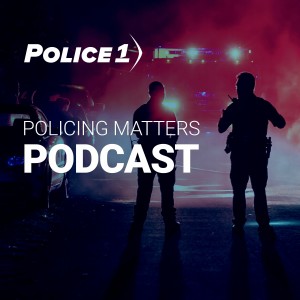
Talking the beat to cover what matters to you as an LEO. Join deputy chief Jim Dudley (ret.) every weekly as he sits down with law enforcement leaders and criminal justice experts to discuss strategy, challenges and trends in policing.
Talking the beat to cover what matters to you as an LEO. Join deputy chief Jim Dudley (ret.) every weekly as he sits down with law enforcement leaders and criminal justice experts to discuss strategy, challenges and trends in policing.
Episodes

Friday Feb 08, 2019
Words of wisdom: Applying famous quotes to policing
Friday Feb 08, 2019
Friday Feb 08, 2019
Henry Ford once said, “When everything seems to be going against you, remember that the airplane takes off against the wind, not with it.” This famous quote can easily be applied to law enforcement in 2019, with so many factors seemingly going against the profession. Winston Churchill once said, “Courage is what it takes to stand up and speak. Courage is also what it takes to sit down and listen.” Police officers at every level have countless opportunities to listen to citizens and collect information and intelligence about what's happening in the community. There are myriad famous quotes that can be applied to law enforcement. In this podcast segment, Jim and Doug share some of their favorites.

Friday Feb 01, 2019
Reducing police officer suicides
Friday Feb 01, 2019
Friday Feb 01, 2019
In early January, Blue H.E.L.P. — an organization that tracks officer suicides while simultaneously seeking to prevent such tragedies from occurring — issued an announcement stating that in 2018, at least 158 officers died by suicide. This is nine percent more than the total number of line-of-duty deaths resulting from 15 other causes such as felonious assault, patrol vehicle accident, heart attack, and duty-related illness. It is also the third straight year that suicides occurred in greater number than duty deaths. In this podcast segment, Jim and Doug discuss the crisis of officers dying by suicide, and offer some thoughts on ways to better help officers nearing crisis.

Friday Jan 25, 2019
Why are hate crimes on the rise?
Friday Jan 25, 2019
Friday Jan 25, 2019
According to FBI data released in 2018, hate crimes rose by 17 percent in 2017 compared with the previous year. It was the third straight year showing an increase in hate crimes. The offenses were most commonly motivated by hatred over race, ethnicity or ancestry. Nearly a fifth of the offenses were motivated by hatred over religion. Sexual orientation and gender identity hatred were also listed as biases motivating criminal acts. In this week's podcast segment, Jim and Doug discuss the FBI's findings, and explore reasons why the reporting of hate crimes is seemingly on the rise.

Friday Jan 18, 2019
Why agencies should keep mounted, bike and foot patrols
Friday Jan 18, 2019
Friday Jan 18, 2019
Walking the beat is a fundamental element to community policing. Other forms of patrol aimed principally at community engagement have officers mounted atop equine partners, and rolling around town on tricked-out mountain bikes. In all these cases, officers on foot create opportunities for the public to connect with their police (and vice versa). Conversely, when officers are wrapped in two tons of metal and plastic, that opportunity for real connection is essentially lost. In this podcast segment, Jim and Doug discuss the need for agencies to keep these types of patrol efforts well-staffed and supported.

Friday Jan 11, 2019
In what direction does the First Step Act lead us?
Friday Jan 11, 2019
Friday Jan 11, 2019
Proponents of the First Step Act — a bipartisan law aimed at reforming the criminal justice system — say it would significantly improve the prison system. Opponents say there are loopholes that would allow dangerous criminals with a high probability to reoffend to be released from prison. The text of the law says that the BOP would adopt a risk assessment tool, assess all federal prisoners for their risk of recidivism, and categorize them as minimum, low, medium, or high risk. In this podcast segment, Jim and Doug discuss the First Step Act.

Friday Jan 04, 2019
Facial recognition software in law enforcement
Friday Jan 04, 2019
Friday Jan 04, 2019
Last year, rights groups and even Amazon employees and stockholders sought to stop that company from providing its Rekognition software to law enforcement agencies. By all accounts, that effort has failed, as police are using the software—as well as solutions from other vendors—more and more to identify wanted criminals, missing people and suspected terrorists spotted on video. In this podcast segment, Jim and Doug discuss the use of the technology, its limitations, and its potential for the future.

Thursday Dec 20, 2018
Traffic stop safety: Tactics to keep officers safe
Thursday Dec 20, 2018
Thursday Dec 20, 2018
Traffic stops are one of the most common activities for law enforcement officers on patrol. They are the epitome of proactive, self-initiated policing. They are also, however, sometimes deadly. Officers can be struck by passing vehicles, dragged by a vehicle fleeing the stop, assaulted physically either with personal weapons (fists and feet) or by weapons up to and including firearms. In this podcast segment, Jim and Doug discuss the benefits of things like the passenger side approach and waiting for backup to arrive before even initiating the stop.

Thursday Dec 20, 2018
Police responsibility to regularly maintain equipment and gear
Thursday Dec 20, 2018
Thursday Dec 20, 2018
In New York, some 20,000 DUI arrests are in jeopardy because of false verifications due to aging and inaccurate equipment. Agencies are required to conduct regular maintenance of a variety of types of equipment, and yet it would appear that in some cases, that regular maintenance is not being conducted, putting not only convictions at risk, but possibly even lives. In this podcast segment, Jim and Doug discuss the responsibility for agencies to check to be sure their gear is in good working order.

Thursday Dec 13, 2018
2018 in Review: From legal weed to lip sync battles
Thursday Dec 13, 2018
Thursday Dec 13, 2018
The end of the year is upon us, and looking back it is clear that 2018 zipped by like lightning. During the year, Jim and Doug covered many topics in the weekly Policing Matters podcast. In this special segment, the pair takes a look back at some of the trends and events that mattered in law enforcement in the past 12 months—from lip sync battles to policing the homeless to immigration enforcement.

Friday Dec 07, 2018
Why officers should regularly shun ‘screen time‘
Friday Dec 07, 2018
Friday Dec 07, 2018
Too often, when we get off work and out of whatever uniform we wear during the day (or night, depending on your assigned shift), one of the first things we do is to plop ourselves in front of a screen of some kind. We open up the laptop, the tablet, or even our phone, and voluntarily allow ourselves to be assaulted by millions of relentless pixels. In this podcast segment, Jim and Doug discuss the benefits of "unplugging," such as strengthening interpersonal relationships, reducing overall stress, and increasing emotional intelligence. Unplugging can even lead to better physical fitness and weight loss.
